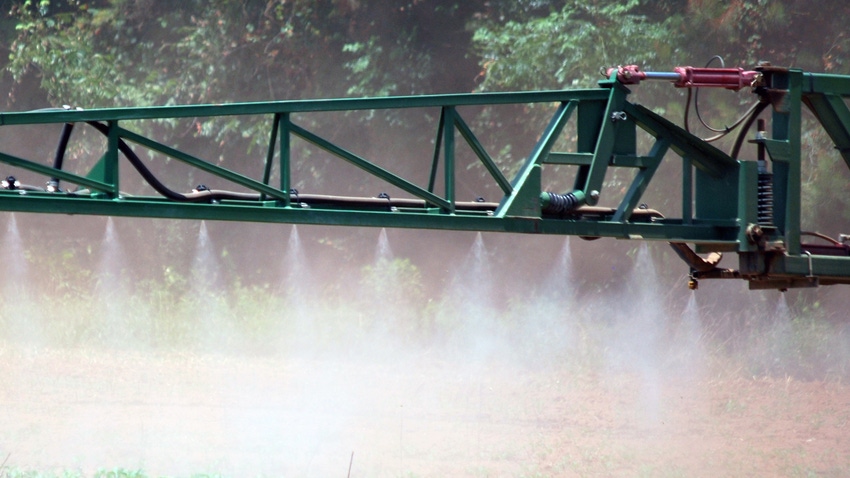
In-season dicamba complaints remain low in the Southeast, but the season is not over. Applications are behind schedule in some places due to early season weather, and regulatory and Extension officials hope applicators remain vigilant to the end.
As of July 9, the Structural Pest Control and Pesticides Division of the North Carolina Department of Agriculture received seven official dicamba drift complaints: two involving damage to grapes, two involving damage to non-dicamba tolerant soybeans; two involving tobacco and one involving tomatoes.
Andrea Ashby, spokesperson for the North Carolina Department of Agriculture, said investigations on all three currently remain open and the department cannot provide additional comments on ongoing investigations.
Tommy Gray directs the Georgia Department of Agriculture’s Plant Industry division.
“We’re still in pretty good shape. We do have two official dicamba, in-crop, drift complaints. Both are in the final stages of investigation. One case alleges dicamba drift to blueberries and the other to non-tolerant soybean. A lot of applications have taken place in the last few weeks. Double cropping will probably result in some dicamba applications to tolerant soybeans extending into early August,” he said in a July 10 email.
Tony Cofer directs the Pesticides, Plant and Professional Services at the Alabama Department of Agriculture.
"Specifically, in Alabama we have had two dicamba related complaints to date. We are hopefully that the required training of applicators along with the other risk mitigation measure on the 2018 labels are helping to reduce the cases of misuse,” said Cofer on July 10.
Cofer is also the current president of the Association of American Pesticide Control Officials, which he says is working closely with EPA Office of Pesticide Programs and surveying the states where over the top use is registered and providing the information to EPA.
“We are also having calls every two weeks with EPA in order for states to provide updates on the status of any issues arising with the use of dicamba. AAPCO is making every effort to provide EPA with the best current information regarding the use of over the top dicamba,” Cofer said.
Charlie Cahoon, Extension weed specialist for corn and cotton at North Carolina State University, said it has been generally quiet on the dicamba drift complaint front as June ended. He did say he has heard of three complaints of 2, 4-D drift damage to non-resistant cotton so far, two of which drift originated from a pasture or roadside application.
“We probably hear 1/10th of what is actually going on,” Cahoon said. “Some of the issues are self-inflicted or just misapplication that growers recognize later. We usually do not get called out in these situations.”
Cahoon explained that cotton, corn and peanut planting was delayed this year due to rain with many farmers pushing back soybean planting. He said this has probably delayed some of the dicamba applications in North Carolina.
Cahoon also notes that Matt Vann, North Carolina State University Extension tobacco specialist, has not been contacted yet about any dicamba drift issues on tobacco.
“The situation could change as post applications of dicamba pick up in the next week or so,” Cahoon said on June 28. “A lot depends on if folks were able to get control of their weeds in soybeans early or if it’s going to be a situation where they feel they have to use dicamba before the weeds got away from them.”
Still, Cahoon emphasizes that the N.C. State weed science team is optimistic that the drift situation will be on par with last year and are hopeful that the number of official drift complaints will be lower than last year.
“Outside of the issues we had on tobacco last year, I would call last year a success in North Carolina,” Cahoon said.
“The N.C. State weed science (department) continues to urge growers to apply all they learned in the “Auxin Herbicides: Best Management Practices” trainings spearheaded by the N.C. State Weed Science team and the North Carolina Department of Agriculture during 2017 and 2018,” Cahoon stressed.
Michael Flessner, Virginia Tech Extension weed specialist, reports that as the month of June ended, there is no dicamba drift issues in the commonwealth.
“While dicamba has been applied to some acres, overall Virginia is behind on herbicide applications due to rain pushing back planting of full season soybeans. Double-crop soybean planting is going normally, but dicamba applications on those acres may not occur for another two weeks in some cases,” Flessner said on June 29.
“Last year, we had a couple reports of dicamba drift in mid-to-late July, but the bulk of issues were reported the first week of August (meaning that application went out 10 to 20 days before that) so I’m not ready to call this season a success, but I am happy with the lack of reports so far. I would caution applicators that we need to continue to be diligent and careful with dicamba applications, and really, every pesticide,” Flessner said.
About the Author(s)
You May Also Like








